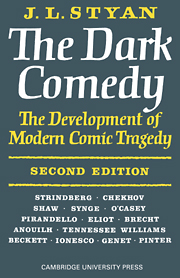Preface to the Second Edition
Published online by Cambridge University Press: 15 December 2009
Summary
In the short time since this book was written, the sense that we are witnessing something of a dramatic renaissance has been confirmed. Labels like ‘the theatre of the absurd’ and ‘the theatre of cruelty’ have been selected and partly discarded as too limiting. Drama of importance has been written by new playwrights like Edward Albee, John Arden, Saul Bellow, Harold Pinter and Peter Weiss. Older playwrights like Jean Anouilh, Samuel Beckett, Jean Genêt, Eugène Ionesco and Tennessee Williams have continued to write major works. Earlier playwrights like Chekhov, Shaw, Pirandello, O'Casey and Brecht are being increasingly recognized for their contribution to the resurgence of tragicomedy and the direction it has taken. The theatre has become, more than it ever was, an international market-place.
I have therefore taken the opportunity offered by a new edition to bring the book up to date and to expand the reading list, to modify or reinforce earlier judgments, and to include extended illustrative analysis (of the kind which was found helpful in the first edition) from Mother Courage and Waiting for Godot, two plays of seminal influence in the 1960s and, no doubt, for the future.
- Type
- Chapter
- Information
- The Dark Comedy , pp. vPublisher: Cambridge University PressPrint publication year: 1968



